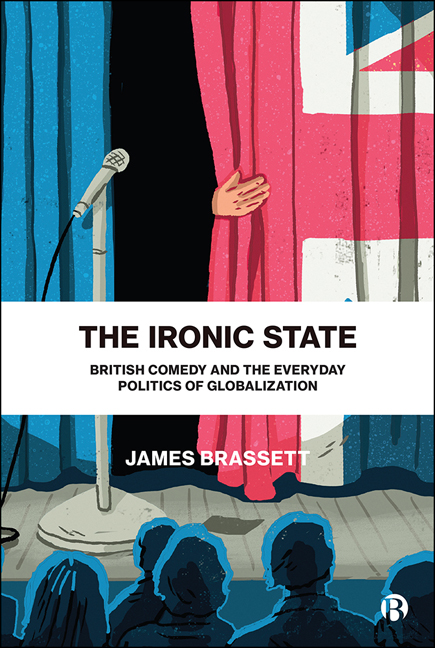Book contents
- Frontmatter
- Contents
- Acknowledgements
- Introduction: Comedy and the Politics of (Global) Resistance
- 1 Everyday Comic Resistance in Global Context
- 2 The Satire Boom: Imperial Decline and the Rise of the Everyday Elite
- 3 Alternative Comedy and Resistance to ‘Thatcher’s Britain’
- 4 Irony and the Liminality of Resistance
- 5 Austerity and the Rise of Radical Comedy
- 6 Brexit, or How I Learned to Stop Worrying and Love the Single Market
- 7 The Globalization of Comic Resistance?
- Bibliography
- Index
3 - Alternative Comedy and Resistance to ‘Thatcher’s Britain’
Published online by Cambridge University Press: 04 January 2022
- Frontmatter
- Contents
- Acknowledgements
- Introduction: Comedy and the Politics of (Global) Resistance
- 1 Everyday Comic Resistance in Global Context
- 2 The Satire Boom: Imperial Decline and the Rise of the Everyday Elite
- 3 Alternative Comedy and Resistance to ‘Thatcher’s Britain’
- 4 Irony and the Liminality of Resistance
- 5 Austerity and the Rise of Radical Comedy
- 6 Brexit, or How I Learned to Stop Worrying and Love the Single Market
- 7 The Globalization of Comic Resistance?
- Bibliography
- Index
Summary
Introduction
The emergence of (what became known as) ‘alternative comedy’ is widely regarded as an important critical moment in the history of British comedy, where comedians began to break with the idea that their craft was ‘just for laughs’ (Giappone, 2017). A range of new acts fundamentally reinvented the nature and form of comedy to place in question prior conceptions of the gag, the audience, and the overall ‘point’ of humour. Whereas the satire boom had touched upon politics through the nature of its targets and a wider public debate over whether it really changed anything, alternative comedy foregrounded a set of avowedly resistant concerns with anti-racism, anti-sexism, anti-capitalism and ‘Thatcher’ (Lee, 2010; Schaffer, 2016).
While the previous chapter explored a certain ‘anti-elitist elitism’ in the satire boom, whose protagonists were mainly white, male, upper-class, Oxbridge and so on, the egalitarian politics of alternative comedy was often embodied in the comedians themselves, who came from ‘art schools’ and ‘lesser universities’. Suddenly comedians were working-class, black, female, they had regional accents, were angry, or anarchic. A punk mentality informed their audience interactions as the new medium of ‘stand-up’ explored the possibilities of spontaneity, provocation and violence in humour (Sayle, 2016). In addition, surviving outside the Oxbridge production line of student reviews and BBC commissions required an alternative economic model. Their circuit consisted of pioneering new comedy clubs like The Comedy Store and the Comic Strip, as well as regional arts centres, student unions and pubs. Diverse backgrounds, alternative pathways and radical innovations in ‘stand-up’ would ultimately create a form of comedy that resembled an artistic or political movement (British Comedy Guide, 2016). Gone were the bon mots and witty reflections of satire, to reveal a more experimental, uncompromising and ‘revolutionary’ set of practices. Indeed, this more ‘politicized’ understanding began to inform the wider self-understanding of comedy. As Stewart Lee (2010: 2–3) recounts:
there was a Year Zero attitude to 1979. Holy texts found in a skip out the back of the offices of the London listings magazine Time Out tell us how, with a few incendiary post-punk punchlines, Alexei Sayle, Arnold Brown, Dawn French, and Andy de la Tour destroyed the British comedy hegemony of upper-class Oxbridge Satirical Songs and Working-Class Bow Tie-Sporting Racism.
- Type
- Chapter
- Information
- The Ironic StateBritish Comedy and the Everyday Politics of Globalization, pp. 57 - 76Publisher: Bristol University PressPrint publication year: 2021



